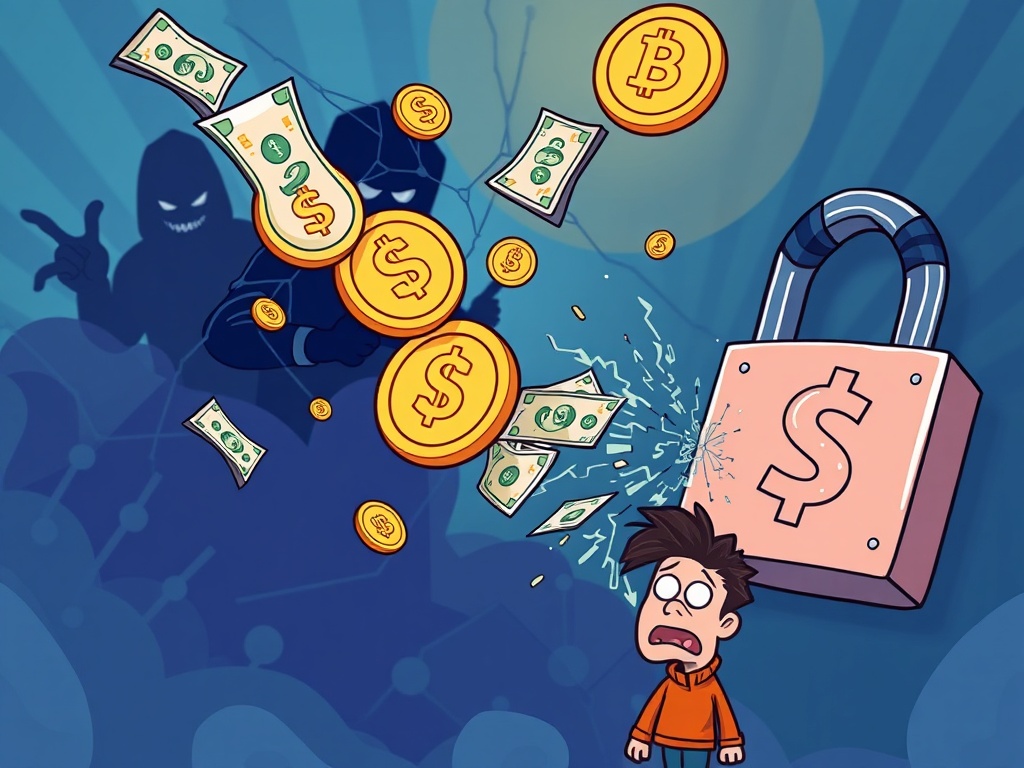BitcoinWorld

Crypto Hacks: An Alarming $142 Million Loss in July
The world of cryptocurrency, known for its innovation and rapid growth, often faces a persistent challenge: security breaches. July 2023 proved to be a particularly challenging month for digital asset holders, as crypto hacks surged, leading to an alarming $142 million in losses. This significant increase from previous months highlights a critical need for heightened vigilance and robust security measures within the decentralized finance (DeFi) ecosystem and beyond. Understanding these threats is the first step towards safeguarding your digital wealth.
Understanding the Alarming Rise in Crypto Hacks
According to blockchain security firm PeckShield, July saw a stark escalation in malicious activities across the crypto landscape. A staggering 17 major crypto hacks were recorded, culminating in total losses of $142 million. This figure represents a concerning 27.2% increase compared to June, indicating a growing trend of sophisticated attacks targeting various blockchain projects and user assets.
These incidents aren’t merely abstract numbers; they represent tangible financial devastation for individuals and projects alike. From compromised private keys to exploited smart contract vulnerabilities, the methods employed by attackers are diverse and constantly evolving. The sheer volume and value of assets lost underscore the urgent need for robust security frameworks and continuous education for all participants in the crypto space.
Why Are Crypto Hacks Becoming More Frequent?
The increasing frequency of crypto hacks can be attributed to a confluence of factors, ranging from technical complexities to human elements. As the crypto ecosystem expands, so do the potential attack surfaces. Here are some key reasons contributing to this worrying trend:
- Complexity of DeFi Protocols: Decentralized finance (DeFi) platforms, while innovative, often involve intricate smart contracts and interconnected protocols. Bugs or vulnerabilities in these complex codes can be exploited, leading to massive losses.
- Lack of Rigorous Audits: Many new projects rush to market without undergoing thorough security audits by reputable firms, leaving critical loopholes open for attackers to exploit. Even audited projects can sometimes have undiscovered vulnerabilities.
- User Negligence and Phishing: Social engineering tactics, such as phishing scams, remain highly effective. Users can inadvertently reveal private keys, seed phrases, or login credentials through deceptive websites or malicious links, directly leading to crypto hacks.
- Sophistication of Attackers: Cybercriminals are becoming increasingly sophisticated, employing advanced techniques like flash loan attacks, re-entrancy attacks, and supply chain attacks to compromise systems.
- Interoperability Challenges: As more blockchains and protocols aim for interoperability, the bridges and cross-chain solutions connecting them can become weak points if not secured meticulously.
- Regulatory Ambiguity: In some jurisdictions, the lack of clear regulatory frameworks can inadvertently create an environment where bad actors can operate with less fear of legal repercussions, making it a more attractive target for crypto hacks.
Protecting Your Digital Assets: Actionable Steps Against Crypto Hacks
While the statistics may seem daunting, there are concrete steps you can take to significantly reduce your risk of falling victim to crypto hacks. Personal security practices are paramount in this decentralized world:
- Embrace Hardware Wallets: For storing significant amounts of cryptocurrency, hardware wallets (e.g., Ledger, Trezor) are considered the gold standard. They keep your private keys offline, making them virtually immune to online hacking attempts.
- Implement Two-Factor Authentication (2FA): Always enable 2FA on all your crypto exchanges, wallets, and related accounts. Use authenticator apps (like Google Authenticator or Authy) rather than SMS-based 2FA, which is more vulnerable to SIM-swapping attacks.
- Conduct Thorough Due Diligence: Before investing in any new project, especially in the DeFi space, research it extensively. Look for independent security audits, check the team’s credibility, and understand the protocol’s mechanics. If it seems too good to be true, it probably is.
- Beware of Phishing and Scams: Always double-check URLs, email addresses, and social media handles. Malicious websites often mimic legitimate ones with subtle differences. Never click on suspicious links or download attachments from unknown sources.
- Understand Smart Contract Risks: When interacting with DeFi protocols, be aware that smart contracts can contain bugs. Only interact with protocols that have undergone rigorous security audits by reputable firms, and even then, understand that no system is 100% foolproof.
- Keep Software Updated: Regularly update your operating system, web browser, antivirus software, and crypto wallet applications. These updates often include critical security patches that protect against newly discovered vulnerabilities.
- Secure Your Seed Phrase: Your seed phrase (or recovery phrase) is the master key to your funds. Store it offline, in multiple secure locations, and never share it with anyone. Do not store it digitally on your computer or cloud services.
- Stay Informed and Vigilant: Follow reputable blockchain security firms, crypto news outlets, and security researchers. Being aware of the latest attack vectors and scams can help you anticipate and avoid potential threats.
The Broader Impact of Escalating Crypto Hacks
The consistent surge in crypto hacks has far-reaching implications beyond just financial losses. It erodes trust in the nascent crypto industry, especially among institutional investors and mainstream users who are already hesitant due to volatility and perceived risks. This erosion of confidence can slow down adoption and innovation.
Furthermore, the increase in illicit activities attracts greater scrutiny from global regulators. Governments are likely to push for stricter regulations, KYC (Know Your Customer) and AML (Anti-Money Laundering) compliance, and potentially more centralized oversight, which could run counter to the decentralized ethos of cryptocurrency. The industry as a whole is challenged to develop more resilient infrastructure and foster a culture of security to mitigate these pervasive threats and ensure a safer digital future.
The alarming $142 million loss to crypto hacks in July serves as a powerful reminder of the persistent security challenges within the digital asset space. While the innovative potential of blockchain technology is undeniable, it comes with inherent risks that demand constant vigilance and proactive measures. By understanding the common attack vectors and adopting robust security practices, individuals can significantly protect their digital assets. For the industry, this trend underscores the critical need for continuous security enhancements, collaborative efforts, and a commitment to building a more secure and trustworthy ecosystem. Staying informed and prioritizing security is not just an option, but a necessity in navigating the evolving landscape of cryptocurrency.
Frequently Asked Questions (FAQs)
Q1: What is a crypto hack?
A crypto hack refers to unauthorized access or manipulation of cryptocurrency wallets, exchanges, or blockchain protocols, resulting in the theft or loss of digital assets. These attacks exploit vulnerabilities in software, smart contracts, or through social engineering.
Q2: How much money was lost to crypto hacks in July 2023?
According to blockchain security firm PeckShield, approximately $142 million was lost due to 17 major crypto hacks recorded in July 2023, marking a significant increase from the previous month.
Q3: What are the most common types of crypto hacks?
Common types of crypto hacks include DeFi protocol exploits (e.g., flash loan attacks, re-entrancy attacks), phishing scams, private key compromises, rug pulls, and vulnerabilities in centralized exchanges or bridges.
Q4: How can I protect myself from crypto hacks?
To protect yourself, use hardware wallets for cold storage, enable two-factor authentication (2FA), be wary of phishing attempts, conduct thorough due diligence on projects, only interact with audited smart contracts, and keep your software updated.
Q5: Which firm reported the July 2023 crypto hack statistics?
The statistics regarding the $142 million in crypto losses from July 2023 were reported by PeckShield, a prominent blockchain security firm, via their official X (formerly Twitter) account.
Q6: Is the crypto industry doing anything to combat hacks?
Yes, the crypto industry is continuously working to combat hacks through various initiatives, including enhanced security audits, bug bounty programs, developing more secure coding practices, improving wallet security, and fostering community education on best practices.
If you found this article insightful, please consider sharing it with your network! Spreading awareness about cryptocurrency security is crucial for protecting our collective digital future. Share this article on social media to help others stay informed and secure their assets.
To learn more about the latest crypto market trends, explore our article on key developments shaping Bitcoin price action.
This post Crypto Hacks: An Alarming $142 Million Loss in July first appeared on BitcoinWorld and is written by Editorial Team





